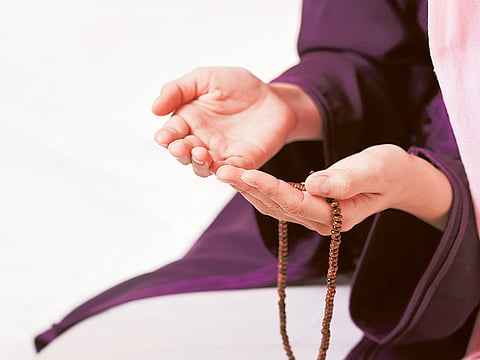Can mild or asymptomatic coronavirus patients fast during Ramadan?
Doctors advise patients keep an eye on their health, and take medications as prescribed

Abu Dhabi: Patients who have contracted the coronavirus but are asymptomatic may fast during Ramadan as long as they keep an eye on their health, doctors have advised.
These residents, who will be advised to self-isolate within their homes, must also report any changes or symptoms to doctors, they added.
With Ramadan set to start on Thursday, residents have been wondering about Islamic rulings regarding the permissibility of fasting during a pandemic. The UAE Fatwa Council yesterday announced that healthy residents must fast as usual, but that patients diagnosed with COVID-19 need not fast.
However, Muslims around the world look forward to the Holy Month, and consider it an essential duty and privilege to complete the dawn-to-dusk fasting.
“Patients who have moderate or severe symptoms are treated in isolation within hospital settings, and these patients will naturally not be able to observe the Ramadan fasting. On the other hand, the majority of asymptomatic patients or those with mild symptoms will be able to stay home and tend to themselves,” Dr Faisal Dalfi, internal medicine specialist at Burjeel Hospital Abu Dhabi, told Gulf News.
“Given that this virus is very new, the impact of fasting on COVID-19 patients has not been researched. [But] asymptomatic patients who feel healthy and fit should be able to fast in Ramadan. Again, they must be self-aware and any development of symptoms or change in condition must be discussed with a doctor,” added Dr Fernanda Bonilla, staff physician for infectious diseases at the Cleveland Clinic Abu Dhabi.
Maintain a healthy lifestyle
This year, fasting will extend for about 14 hours, starting from around 4:30AM till a little before 7PM. IN general, patients on medication must ensure to take all their doses between iftar – the meal eaten when ending the fast – and suhoor, the meal before starting the fast. This applies to COVID-19 patients as well.
“In accordance with UAE national health guidelines, we now prescribe hydroxychloroquine even for mild and asymptomatic patients. So if these people choose to fast, they must simply make sure they take their pills twice daily for a six-day course of treatment, as advised,” Dr Dalfi said.
Patients with comorbidities
Patients with comorbidities must practise even more caution.
“Hydroxychloroquine has however been shown to lead to a drop in blood sugar, so diabetics who contract COVID-19 but are asymptomatic must be especially careful if they choose to fast. This also applies to people with kidney disease and hypertension,” Dr Dalfi said.
Dr Rasha Alani, family medicine specialist at Medcare Medical Centre at Al Khawaneej, added that patients who choose to fast despite a COVID-19 diagnosis should be clear about their overall disease management plan.
Maintain a healthy lifestyle
Needless to say, patients must follow healthy lifestyles that strengthen their immunity, especially as human immunity is the main weapon against COVID-19 in the absence of vaccines and internationally-agreed upon treatment protocols.
“[This includes] proper nutrition, with plenty of green leafy vegetables, unprocessed foods and sufficient water intake during non-fasting hours so that their immune system is operating at an optimum level during Ramadan,” Dr Bonilla said.
Fluid intake
Dr Dalfi stressed on the need to stay hydrated, saying that it is key to propping up one’s immunity.
“We always advise proper hydration to recover even from a simple flu as water helps flush out toxins and helps organs function. But in addition to drinking enough water, patients should avoid fizzy and sugary drinks. In Ramadan, many families like to include traditional drinks like Vimto in their iftar, but these are loaded with sugar and therefore do not help with hydration,” he explained.
The importance of sleep
Asymptomatic COVID-19 patients also cannot afford to miss out on quality sleep if they are fasting.
Dr Alani said the lack of proper sleep is one of the major reasons for illness during the Holy Month, as people tend to socialise into the early hours of the morning.
“Given the need for social distancing, COVID-19 patients who fast should at least be able to ensure that this is not a problem,” she said.
Sleep is known to boost immunity by allowing for the release of protective signalling proteins called cytokines, which help target infections and control inflammation in the body. When the body is fighting an infection, enough cytokines, which are secreted by cells of the immune system, must be present. Studies have gone on to show that people who do not get enough quality sleep are more likely to get sick after being exposed to a virus.
“I would advise that mild and asymptomatic COVID-19 patients ensure they get at least seven hours of good sleep every day. Sleep is a restorative process, which is especially important when the body is fighting a virus,” Dr Dalfi said.
Dr Bonilla also advised that residents prioritise their Ramadan sleep at a time when the world if fighting a deadly virus outbreak.
“Adults should aim for at least seven to eight hours of good sleep each night, whereas teenagers need nine to 10 hours of sleep and schoolchildren require 10 hours or more every night,” she recommended.
Quit smoking
Whole Ramadan has always been presented as a time to give up unhealthy practices, residents with mild or asymptomatic COVID-19 should use the opportunity to give up smoking.
“There is growing evidence to suggest that people who smoke are more likely to be severely impacted by COVID-19. Ramadan is an ideal time to break the habit. People will be able to see a noticeable improvement in their health within a few days to some weeks after quitting, thus reducing their risk of developing severe symptoms from the infection,” Dr Bonilla said.






